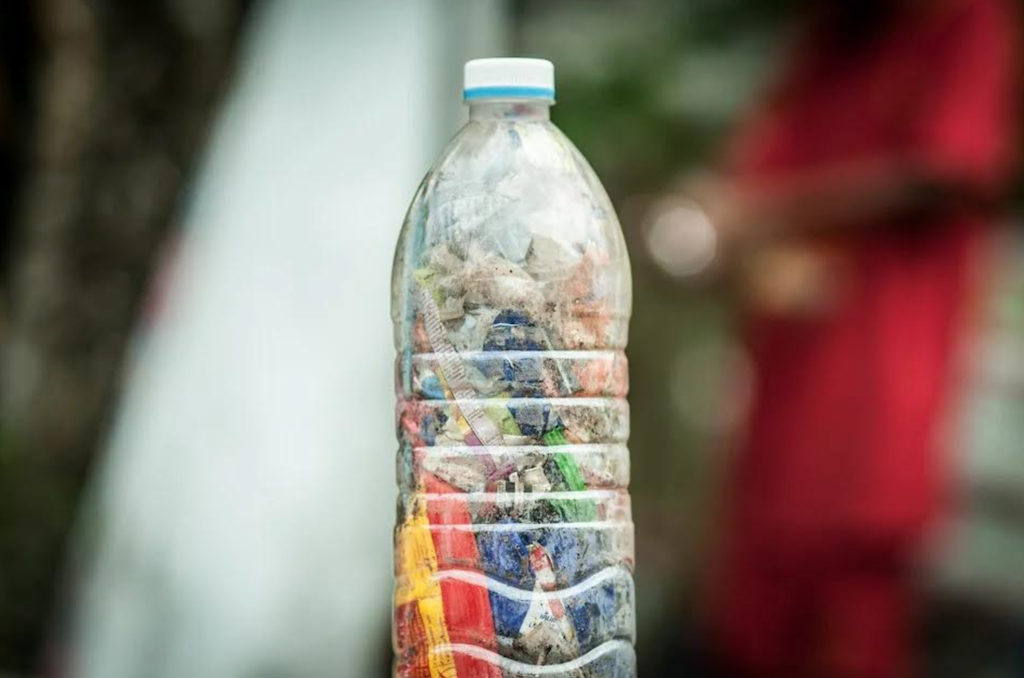ELBA tackles plastic pollution with new Ecobrick initiative
Written by Stanley Shepherd and Ashley Rice, from ELBA’s Challenge team
Plastic pollution has become one of the most pressing environmental issues, with an increasing amount of plastic being manufactured, thrown away and reaching the biosphere, where it harms creatures large and small. Lockdown has exacerbated the issue in London with more plastic waste entering into waterways due to bins overflowing with rubbish. One campaigner described the problem as a “plastic pandemic.”
Around 50% of the 380 million tons of plastic produced every year are single use, meaning that they are usually only used once before being recycled or thrown away. On top of this, only 10-13% of plastic items are recycled world-wide. The remaining plastic is thrown into landfill, where it is either buried or finds its way into water. The River Thames has some of the highest recorded levels of microplastics for any river in the world. An estimated 94,000 microplastics per second flow through the river in certain places. Crabs in the Thames have been found to contain tangled plastic in their stomachs, including fibres and microplastics from sanitary pads, balloons, elastic bands, carrier bags and now, masks and gloves.
 To tackle the problem, ELBA is engaging corporate volunteers to create Ecobricks. Ecobricks are a simple, low-tech solution to put our plastic to good use in short and long term applications. Plastic is packed into bottles which make building blocks that can be reused over and over again. Ecobricks safely secure plastic out of the biosphere and build spaces that enrich our community. The next time you hold a plastic bottle in your hand, try thinking of it not as rubbish to be disposed of, but as the building block for something extraordinary.
To tackle the problem, ELBA is engaging corporate volunteers to create Ecobricks. Ecobricks are a simple, low-tech solution to put our plastic to good use in short and long term applications. Plastic is packed into bottles which make building blocks that can be reused over and over again. Ecobricks safely secure plastic out of the biosphere and build spaces that enrich our community. The next time you hold a plastic bottle in your hand, try thinking of it not as rubbish to be disposed of, but as the building block for something extraordinary.
A 2017 report found that London consumes 7.7bn plastic bottles every year, more than anywhere else in the UK. It also has the worst recycling rate in the UK (32%, compared to the national average of 43%). Plastic bottles make up 10% of all litter found in the Thames, taking 450 years to degrade. Making and donating Ecobricks creates a closed loop system, helping to tackle the ever present plastic pollution problem in our streets, rivers and oceans, whilst providing an opportunity to transform our local green spaces with fun, creative, community led designs.
 In the run up to World Environment Day, ELBA is holding an online workshop to teach volunteers how to join the Ecobrick movement and start making their own bricks. When the volunteers have created their Ecobrick, they can use them in their own project or contribute them to ELBA where we will use them in a community project. The end result will depend on how many are donated: With a small number of Ecobricks we will be able to build modular furniture and with a large number we can build raised beds, benches or something sculptural.
In the run up to World Environment Day, ELBA is holding an online workshop to teach volunteers how to join the Ecobrick movement and start making their own bricks. When the volunteers have created their Ecobrick, they can use them in their own project or contribute them to ELBA where we will use them in a community project. The end result will depend on how many are donated: With a small number of Ecobricks we will be able to build modular furniture and with a large number we can build raised beds, benches or something sculptural.
The UN Climate Change Conference (COP26) takes place in November so we would like to hold a Team Challenge then to build with the Ecobricks. They will leave a lasting legacy and demonstrate our commitment to environmental issues and sustainability.
To sign up to the first online session, visit: elbaecobricks.eventbrite.co.uk or contact ashley.rice@elba-1.org.uk to find out more.
To stay up to date with the latest news, opportunities and success stories, please sign up to receive our monthly newsletter, here.


